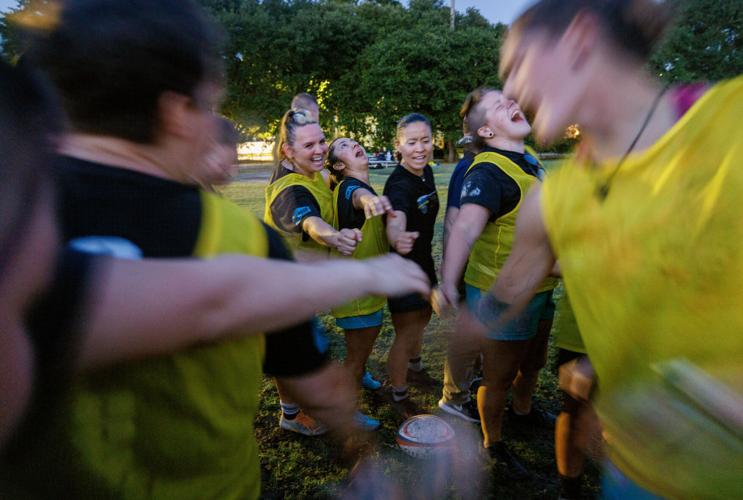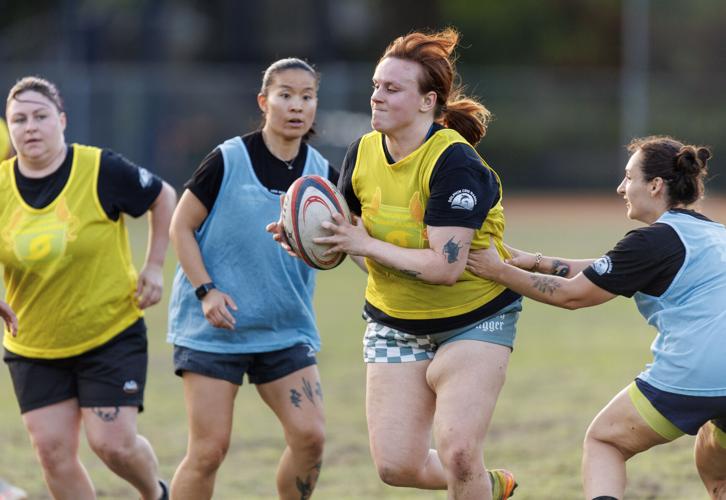Two years ago, Jennifer Goodall had never seen a rugby match and knew little about the sport, which has its roots in 19th century English soccer.
Goodall was listening to music at a local brewery in the spring of 2022 when Veronica Hill, a co-captain for the Charleston Hurricanes Rugby team, approached her about playing one of the most physically demanding sports on the planet.
“Veronica was like, ‘You look like you should play rugby, and I think you should play with us,’” Goodall said.
Goodall, 43, had been a cheerleader in college and despite a hectic home life had been an active distance swimmer for years.

Abbie Boisvert receives the ball from LeAnne Hudson as they run drills during practice Charleston Hurricanes rugby in May 1, 2024.
But rugby?
Goodall was a wife, a mother of two middle-school aged children and an elementary school art teacher, for goodness’ sake.
Did she have the courage to go out and tackle other women without pads?
The short answer, which surprised even Goodall, turned out to be a resounding "Yes."
“I knew next to nothing about the sport, but the players welcomed me, took me on and taught me everything I know,” Goodall said. “It has been a life-changing experience for me. The amount of confidence I’ve gained from playing rugby has been amazing.”
This weekend, the team, which is made up of women ages 19-43, will travel to Austin, Texas, to play in Gulf Coast Super Regionals.
The top 16 teams in the country will compete May 4-5 in Texas to determine who moves onto the championship weekend, two weeks later.
The Hurricanes will face Tampa Krewe on Saturday in an opening-round match.
The Hurricanes are the three-time Division-II Women's champions of the Carolinas Geographic Rugby Union, which is primarily made up of teams from South Carolina, North Carolina, Georgia, Tennessee and Virginia.
Most of the two dozen women who make up the Hurricanes’ rugby squad have a similar origin story. They come from all backgrounds. The vast majority had never played the sport before lacing up their cleats and stepping onto the pitch for the first time.
Selena Dardia, 29, had played lacrosse in college, and was approached by a team member at a local gym to join the fun.
“Never in a million years did I see myself playing rugby,” said Dardia, who works in the food and beverage industry. “I did the ‘rookie camp’ last summer and I was hooked almost from the beginning. I enjoyed the camaraderie and the culture of the sport.”
Dardia went from rookie camp participant to starter for the Hurricanes in just a few months.

April Williams, who dyes her hair for the national tournament, warms up during Charleston Hurricanes rugby practice May 1, 2024, in Charleston.
“Selena is one of the fastest players we have on the club,” said Hurricanes captain LeAnne Hudson, who works as a kayak guide for Charleston Outdoor Adventures. “About half of our team is made up of women who played sports either in high school or college. The other half probably never played an organized sport growing up. This is their first experience playing on a team.”
Much like American baseball, rugby’s beginnings are steeped in myth and legend.
Rugby is said to have originated at the Rugby School in Warwickshire, England, in 1823 when during a game of soccer, William Webb Ellis decided to pick up a ball and run with it.
Like the folklore surrounding Abner Doubleday’s invention of baseball in Cooperstown, N.Y., in 1839, there is very little evidence to support this theory, despite the fact that the Rugby World Cup Trophy is now named after Ellis.
In 1863, at the height of the U.S. Civil War, a collection of English boarding schools and clubs decided upon a set of rules and in 1871 the Rugby Football Union was officially formed.
That same year, the first ever international match was played between England and Scotland, with Scotland taking the win 1-0.
The Hurricanes’ club was founded in 2001, but after the pandemic had trouble finding new recruits.
“We’d have to cancel practices because we’d only get six or seven players come out,” said Hurricanes coach Mady Clark.
Hudson, 27, started a women’s rugby club at Coastal Carolina and when she moved to the Lowcountry in 2021, set out to recruit new players.
“The pandemic killed a lot of clubs,” said Hudson, who played basketball in high school. “We went to a full-court press to get new players.”
The club partnered with the College of Charleston’s rugby team and quickly grew from a half-dozen players to more than 25 regular team members.
“It’s a super empowering sport,” Hudson said. “It’s a whole community with its own culture.”
The biggest issue facing the Hurricanes recently has been finding proper fields for their twice-a-week practices. On this spring night, the team is going through a workout on an empty field in Hampton Park in downtown Charleston.
“Most of the fields are taken up by youth sports and we support that,” Hudson said. “It’s a constant struggle to find practice fields. It would cost around $800 a week to practice at one of the local recreation department fields with lights. We don’t have that kind of money. We’re squatting right now, but it’s tough during the winter when sunset is early.”
The club is a non-profit 501-C organization, and donations can be made at club’s website.
Goodall isn’t sure how much longer she will play the sport. She’s trying to stay in the moment.
“I’ll come to school after a match with bumps and bruises, but my children and students love the fact that I’m playing rugby,” Goodall said. "They want to know how I did and the team did after every match."




















